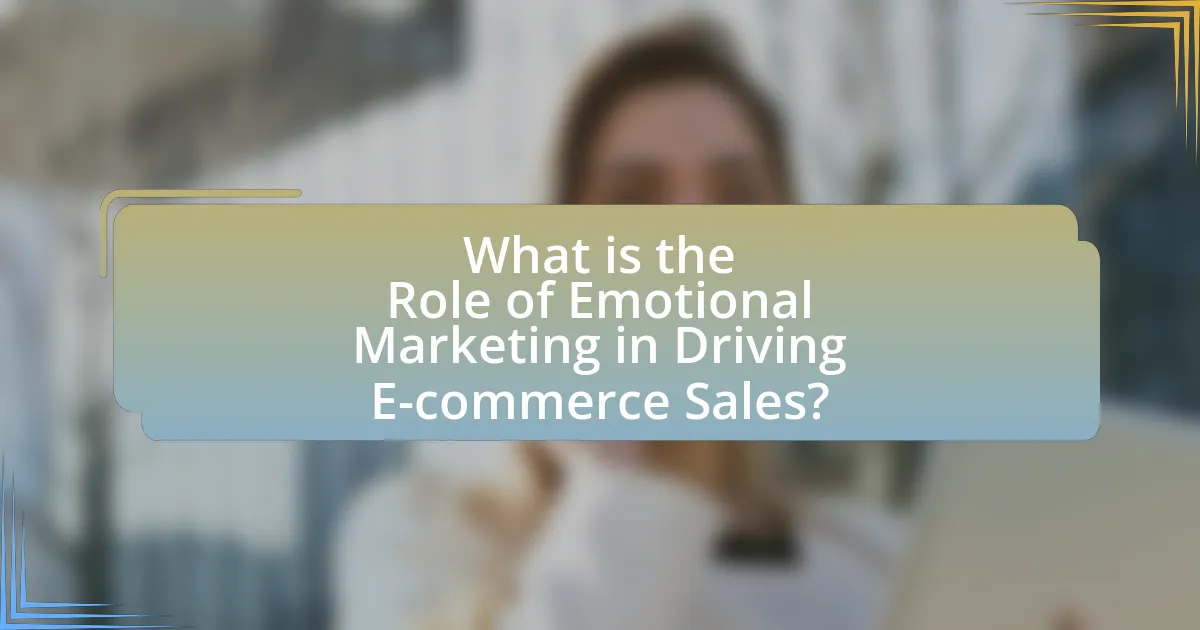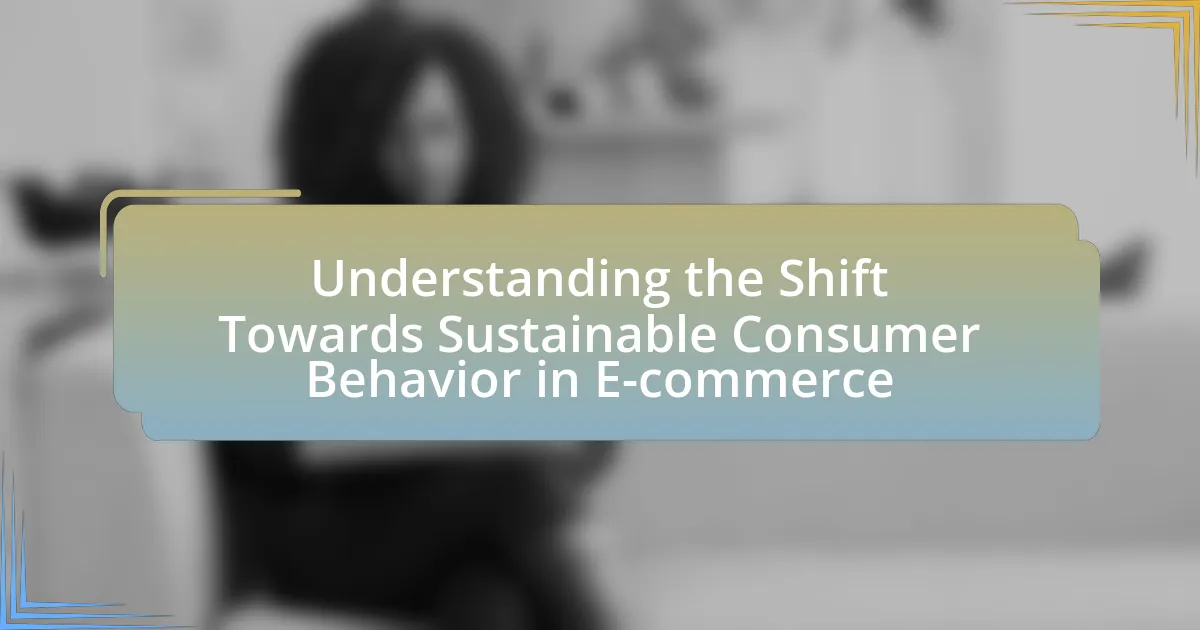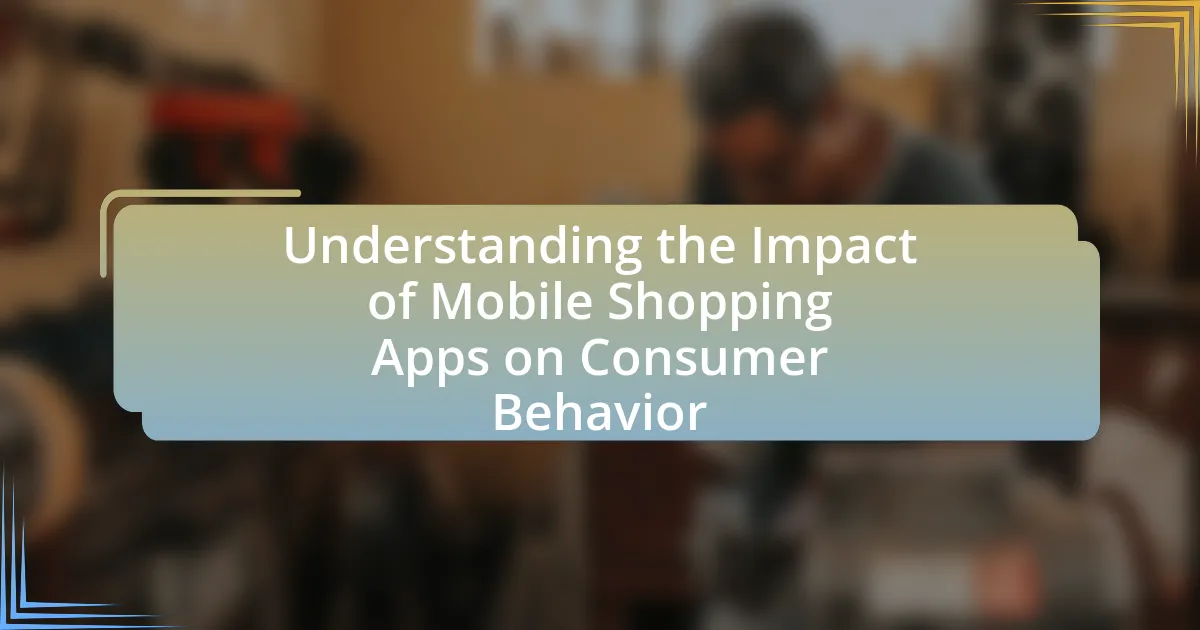Emotional marketing is a pivotal strategy in driving e-commerce sales by fostering personal connections between consumers and brands. This article explores how emotional marketing influences consumer behavior, highlighting the psychological principles that underpin its effectiveness, such as emotional appeal, social proof, and the scarcity principle. It discusses the impact of emotions on purchasing decisions, the importance of emotional marketing for brand loyalty, and the advantages it holds over traditional marketing methods. Additionally, the article provides insights into successful emotional marketing campaigns, best practices for implementation, and the challenges e-commerce businesses may face in leveraging this approach.

What is the Role of Emotional Marketing in Driving E-commerce Sales?
Emotional marketing plays a crucial role in driving e-commerce sales by creating connections between consumers and brands that resonate on a personal level. This strategy leverages emotions such as happiness, nostalgia, or fear to influence purchasing decisions, leading to increased customer loyalty and higher conversion rates. For instance, a study by the Harvard Business Review found that emotionally connected customers are more than twice as valuable as highly satisfied customers, as they tend to spend more and remain loyal over time. By effectively tapping into emotions, e-commerce businesses can enhance their marketing efforts, resulting in improved sales performance.
How does emotional marketing influence consumer behavior in e-commerce?
Emotional marketing significantly influences consumer behavior in e-commerce by creating strong emotional connections that drive purchasing decisions. When brands evoke emotions such as happiness, nostalgia, or empathy, they enhance customer engagement and loyalty, leading to increased sales. Research indicates that emotionally charged advertisements can lead to a 23% increase in sales compared to those that are purely informational. Additionally, a study by the Nielsen Company found that ads with emotional appeal outperform those with rational appeal by a factor of 2 to 1 in terms of effectiveness. This demonstrates that emotional marketing not only captures attention but also fosters a deeper relationship between consumers and brands, ultimately impacting their buying behavior in the e-commerce landscape.
What psychological principles underpin emotional marketing strategies?
Emotional marketing strategies are primarily underpinned by psychological principles such as emotional appeal, social proof, and the scarcity principle. Emotional appeal engages consumers by eliciting feelings such as happiness, nostalgia, or empathy, which can significantly influence purchasing decisions. Research indicates that advertisements that evoke strong emotions can increase consumer engagement and brand loyalty, as demonstrated by a study published in the Journal of Consumer Research, which found that emotionally charged ads led to a 23% increase in sales compared to neutral ads.
Social proof leverages the tendency of individuals to look to others for guidance in their decisions, particularly in uncertain situations. This principle is evident in testimonials and user-generated content, which can enhance credibility and trust in a brand. A study by Cialdini in “Influence: The Psychology of Persuasion” highlights that people are more likely to purchase products that others endorse, reinforcing the effectiveness of social proof in emotional marketing.
The scarcity principle creates a sense of urgency by suggesting that a product is in limited supply, prompting consumers to act quickly to avoid missing out. Research from the Journal of Marketing found that scarcity can increase perceived value and desirability, leading to higher conversion rates in e-commerce settings. These psychological principles collectively enhance the effectiveness of emotional marketing strategies in driving e-commerce sales.
How do emotions affect purchasing decisions in online shopping?
Emotions significantly influence purchasing decisions in online shopping by shaping consumer perceptions and behaviors. Positive emotions, such as joy and excitement, can enhance the likelihood of making a purchase, as they create a favorable impression of the product and brand. Conversely, negative emotions, like fear or anxiety, can deter consumers from completing transactions. Research indicates that 70% of purchasing decisions are based on emotions rather than logic, highlighting the critical role emotions play in e-commerce. Additionally, emotional marketing strategies, such as storytelling and relatable content, can effectively engage consumers, leading to increased sales and brand loyalty.
Why is emotional marketing important for e-commerce businesses?
Emotional marketing is important for e-commerce businesses because it fosters deeper connections with consumers, leading to increased brand loyalty and higher conversion rates. By appealing to emotions, e-commerce brands can differentiate themselves in a crowded market, as studies show that emotionally connected customers are 52% more valuable than those who are just satisfied. Furthermore, emotional marketing can enhance customer engagement; for instance, campaigns that evoke feelings of happiness or nostalgia can significantly boost sharing and interaction on social media platforms, driving organic traffic and sales.
What advantages does emotional marketing provide over traditional marketing?
Emotional marketing offers several advantages over traditional marketing, primarily by fostering deeper connections with consumers. This approach leverages emotions to create memorable experiences, leading to increased brand loyalty and customer engagement. Research indicates that emotionally connected customers are more than twice as valuable as highly satisfied customers, as they tend to spend more and remain loyal longer. Additionally, emotional marketing can enhance message retention; studies show that ads that evoke emotions are more likely to be remembered, with a 23% increase in recall compared to traditional, fact-based advertising. This effectiveness in creating lasting impressions ultimately drives higher conversion rates in e-commerce sales.
How can emotional marketing enhance brand loyalty in e-commerce?
Emotional marketing enhances brand loyalty in e-commerce by creating strong emotional connections between consumers and brands. This connection fosters trust and encourages repeat purchases, as consumers are more likely to remain loyal to brands that resonate with their feelings and values. Research indicates that emotionally connected customers are more than twice as valuable as highly satisfied customers, as they exhibit higher retention rates and increased spending. For instance, a study by the Harvard Business Review found that emotionally engaged customers are 23% more likely to recommend a brand and 10% more likely to repurchase. Thus, leveraging emotional marketing strategies, such as storytelling and personalized experiences, can significantly strengthen brand loyalty in the e-commerce landscape.
What are the key elements of successful emotional marketing campaigns?
Successful emotional marketing campaigns incorporate storytelling, audience connection, and authenticity. Storytelling engages consumers by creating relatable narratives that evoke emotions, leading to stronger brand recall. Audience connection is achieved through understanding and addressing the specific emotional triggers of the target demographic, which can enhance customer loyalty and engagement. Authenticity builds trust, as consumers are more likely to respond positively to brands that demonstrate genuine values and transparency. Research indicates that emotionally connected customers are more than twice as valuable as highly satisfied customers, highlighting the effectiveness of these elements in driving e-commerce sales.
How do storytelling and narratives play a role in emotional marketing?
Storytelling and narratives are essential in emotional marketing as they create a connection between the brand and the consumer, evoking feelings that drive purchasing decisions. By weaving relatable stories, brands can engage customers on a deeper emotional level, making their messages more memorable and impactful. Research indicates that emotionally charged narratives can increase consumer engagement by up to 23 times compared to traditional marketing methods, highlighting the effectiveness of storytelling in fostering brand loyalty and encouraging sales.
What types of emotions are most effective in driving e-commerce sales?
Positive emotions such as happiness, trust, and excitement are most effective in driving e-commerce sales. Research indicates that consumers are more likely to make purchases when they feel positive emotions, as these emotions enhance their overall shopping experience and increase their likelihood of returning to the site. For instance, a study published in the Journal of Consumer Research found that positive emotional appeals can significantly boost purchase intentions, with happiness leading to a 20% increase in sales compared to neutral emotional appeals. Additionally, trust plays a crucial role; when consumers feel secure in their transactions, they are more inclined to complete purchases, as evidenced by a survey from PwC, which revealed that 59% of consumers would stop engaging with a brand they do not trust.
How can e-commerce brands implement emotional marketing strategies?
E-commerce brands can implement emotional marketing strategies by creating personalized experiences that resonate with customers’ feelings and values. This can be achieved through storytelling that connects the brand’s mission with the audience’s aspirations, using visuals and narratives that evoke emotions. For instance, brands like Nike utilize powerful storytelling in their campaigns to inspire and motivate consumers, which has been shown to increase brand loyalty and engagement. Research indicates that emotional connections can lead to a 23% increase in sales, highlighting the effectiveness of emotional marketing in driving e-commerce success.
What challenges do e-commerce businesses face when using emotional marketing?
E-commerce businesses face several challenges when using emotional marketing, primarily including the difficulty in accurately identifying and targeting the right emotions for their audience. This challenge arises because emotional responses can vary significantly among different demographics and cultures, making it hard to create universally appealing campaigns. Additionally, measuring the effectiveness of emotional marketing strategies poses a challenge, as quantifying emotional engagement is less straightforward than tracking traditional metrics like sales or website traffic. Research indicates that 70% of consumers are more likely to remember a brand that evokes an emotional response, yet translating that emotional connection into actual sales remains complex. Furthermore, there is a risk of misalignment between the emotional message and the brand’s core values, which can lead to consumer distrust if the marketing feels inauthentic.
What are some examples of successful emotional marketing in e-commerce?
Successful emotional marketing in e-commerce includes campaigns by brands like Nike, Dove, and Coca-Cola. Nike’s “Just Do It” campaign evokes feelings of empowerment and determination, leading to increased brand loyalty and sales. Dove’s “Real Beauty” campaign focuses on self-esteem and body positivity, resulting in a significant boost in sales and brand perception. Coca-Cola’s “Share a Coke” campaign personalizes the product experience, fostering emotional connections and driving consumer engagement. These examples demonstrate how emotional marketing strategies can effectively enhance customer relationships and drive e-commerce sales.
How did specific brands leverage emotional marketing to boost sales?
Specific brands leveraged emotional marketing to boost sales by creating campaigns that resonate deeply with consumers’ feelings and values. For instance, Coca-Cola’s “Share a Coke” campaign personalized bottles with names, fostering a sense of connection and nostalgia, which led to a 2% increase in sales in the U.S. Similarly, Nike’s “Just Do It” campaign inspires motivation and empowerment, resulting in a 31% increase in sales in 2020. These strategies demonstrate how tapping into emotions like happiness, belonging, and inspiration can effectively drive consumer engagement and sales growth.
What lessons can be learned from these successful campaigns?
Successful campaigns demonstrate that emotional marketing effectively engages consumers and drives e-commerce sales. By tapping into emotions such as happiness, nostalgia, or empathy, brands can create a strong connection with their audience, leading to increased customer loyalty and higher conversion rates. For instance, a study by the Nielsen Company found that ads with emotional content performed twice as well as those with purely rational content, highlighting the importance of emotional resonance in marketing strategies. Additionally, successful campaigns often utilize storytelling to convey their message, making the brand more relatable and memorable, which further enhances consumer engagement and sales performance.
What best practices should e-commerce businesses follow for emotional marketing?
E-commerce businesses should focus on storytelling, personalization, and social proof as best practices for emotional marketing. Storytelling allows brands to connect with customers on a deeper level by sharing relatable narratives that evoke emotions, leading to increased engagement and loyalty. Personalization enhances the shopping experience by tailoring content and recommendations to individual preferences, which can significantly boost conversion rates; studies show that personalized emails can lead to a 29% higher open rate. Social proof, such as customer reviews and testimonials, builds trust and credibility, as 79% of consumers trust online reviews as much as personal recommendations. By implementing these strategies, e-commerce businesses can effectively leverage emotional marketing to drive sales.





